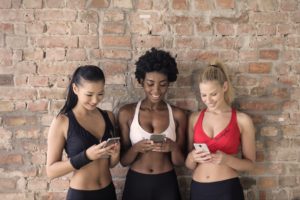A few days ago blogged about the four things I love about fitness culture. Today I’m going to be talking about three things I wish I could change about it.
Since it can be difficult to read people’s tones on the Internet, know that I’m bringing up these concerns because I care about this topic quite a bit. Everything I’m about to say is coming from a genuine, sympathetic perspective.
The Pseudoscience
 What is it about the topics of diet and exercise that attracts so much pseudoscience? I’m all for each fitness enthusiast figuring out what works for them as far as what they eat and what types of exercise they do, but I’m also alarmed by how many ads I’m seeing for products claiming to do things that are either scientifically impossible or could potentially be dangerous if tried without a doctor’s supervision.
What is it about the topics of diet and exercise that attracts so much pseudoscience? I’m all for each fitness enthusiast figuring out what works for them as far as what they eat and what types of exercise they do, but I’m also alarmed by how many ads I’m seeing for products claiming to do things that are either scientifically impossible or could potentially be dangerous if tried without a doctor’s supervision.
For example, I keep seeing advertisements for products that are supposed to block your body from absorbing certain types of calories in the food you eat. I’ve seen other ads for products that claim to be able to get rid of belly fat without diet or exercise, along with many other strange declarations.
While these kinds of ads have been around for a long time, I’m surprised by the fact that people are still falling for them. It would be amazing if there really were a magical pill, powder, device, or spell that allowed everyone to eat and drink whatever they pleased with no side effects, but sadly that’s not how the human body works.
The Consumerism
Consumerism is one of the biggest reasons why I stopped following fitness blogs and social media accounts. As a minimalist, I have no interest in buying a whole wardrobe of fitness clothing in order to have matching outfits when I exercise. What other people wear is not my concern, but I personally don’t see the need to buy new stuff if what I already own still functions perfectly well.
My workout outfits tend to be old, stained, and/or already mostly worn out. I like the fact that I can do any exercise in them I want to without worrying about ruining them. They’re impossible to ruin! If I didn’t wear them while exercising, I’d probably turn them into dust rags or throw them away entirely.
I follow this same rule when deciding when or whether to buy new fitness equipment. A yoga mat and a few pairs of free weights in various sizes are all I need. This seems to run so counter to how many well-known fitness enthusiasts operate that I often find it hard to connect to them.
The Objectification of Women
There are many wonderful stock photos out there of people doing all sorts of exercises, but in order to find them to illustrate my posts on this topic I need to wade through far too many images whose compositions vary widely depending on whether a man or woman is being shown in them.
This is a typical photo of a model who is a man.

Look at how his body is covered by loose, comfortable clothing. The photograph is framed in such a way that the weightlifting itself is what’s most important. The model is lifting heavy weights, and he’s totally focused on doing it properly in that moment. Nobody cares if he’s perspiring, has messy hair, or makes a funny facial expression while he lifts.
I do my best to share pictures of as many different types of fitness models as possible. This includes gender, race/ethnicity, disability, and as many other visible markers of difference as I can possibly find because of how important inclusivity is.
However, this is a mild version of the sort of photos I find when I look for fitness models who are women.

As you’ve probably noticed, they are not exercising at all. They’re using cell phones, and yet this is being tagged as a “fitness” photo. This happens far too often.
I’d like to be perfectly clear here that I have no problem with pictures of women exercising in sports bras and yoga pants. That’s what I wear for some of my workouts, especially if it’s a warm, humid day and I’d prefer to perspire from the workout itself instead of from unnecessary layers of clothing.
The issue is that male models are at least pretending to do workouts while female models are often either posed in sexual/suggestible ways or aren’t shown working out at all.
I don’t know about all of you, but this isn’t a time when I worry about how I look in any way. My only focus is on getting a little stronger, faster, or more flexible than I was the last time I did that routine. It would be really helpful to see this reality reflected in fitness culture imagery.
How do you wish fitness culture would change?

Interesting topic! For me the thing is definitely the pseudoscience. My mom is telling me every other week about things I should eat and things I shouldn’t eat and I just throw up my hands in frustration.
Oh, that sounds so frustrating for sure. Does the list of what you should or shouldn’t eat shift every week?
I’d say every few months it shifts. Everything in moderation is what I say. I can’t keep up with diet fads/trends.
I hear you there. It changes so fast.